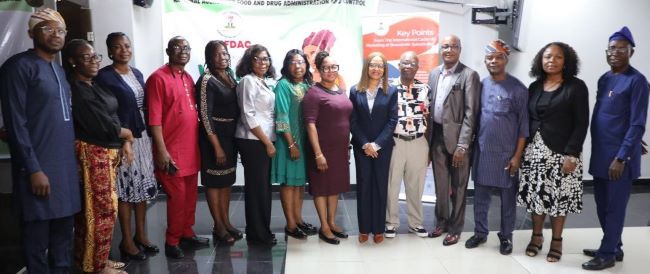By Joke Kujenya
THE NATIONAL Agency for Food and Drug Administration and Control (NAFDAC) has called on nursing mothers to prioritize breastfeeding, highlighting its vital role in safeguarding newborns’ health and reducing the risk of breast and ovarian cancers.
Prof. Mojisola Adeyeye, the Director General of NAFDAC, emphasized the importance of breastfeeding during the 2024 World Breastfeeding Week, which carries the theme “Closing the Gap: Breastfeeding Support for All.”
Breastfed infants, she noted, develop stronger immunity and face fewer childhood illnesses and infections.
Represented by Mrs. Eva Edwards, Director of Food Safety and Applied Nutrition (FSAN), Adeyeye stressed that breastfeeding also contributes to long-term benefits such as higher intelligence quotient (IQ) in children who were exclusively breastfed.

World Health Organization (WHO) guidelines recommend beginning breastfeeding within the first hour of birth and maintaining exclusive breastfeeding for the first six months of life.
Following this period, complementary foods should be introduced while breastfeeding continues for up to two years or longer.
Adeyeye highlighted the necessity of collective efforts to support mothers in making breastfeeding a successful experience.
However, she expressed concern that many women lack the necessary support, including access to trained personnel and consistent, empathetic health advice.
She cited the 2018 Nigeria Demographic and Health Survey, which revealed that although 97% of Nigerian children are breastfed at some point, only 42% are breastfed within the first hour of birth.
Additionally, the 2021 Multiple Indicator Cluster Survey indicated that just 34% of infants aged 0-6 months are exclusively breastfed, showing a slight improvement from previous years but still falling short of WHO’s 50% target by 2025.
Adeyeye called for increased action to scale up optimal breastfeeding practices, which she described as crucial to saving the lives of children and mothers.
She emphasized that breastfeeding requires comprehensive support from various quarters, including healthcare systems, families, communities, and workplaces.
Breastfeeding, she pointed out, not only provides essential nutrition but also plays a significant role in achieving Sustainable Development Goals (SDGs) related to ending hunger, improving nutrition, and promoting health.
During emergencies, when safe food sources are scarce, breast milk remains a critical resource for infants.
In a bid to combat aggressive marketing of breastmilk substitutes, NAFDAC reaffirmed its commitment to supporting breastfeeding practices.
Adeyeye announced the launch of the Lagos State Breastmilk Substitute (BMS) Multisectoral Technical Committee and Advocacy Team, aimed at enforcing compliance with the International Code of Marketing of Breastmilk Substitutes.
The initiative aligns with the National Strategy for the Implementation of the International Code, which serves as a roadmap to promote and monitor breastfeeding practices across Nigeria.
Adeyeye concluded by encouraging the public to appreciate and support breastfeeding mothers, underscoring the importance of a successful and fulfilling breastfeeding journey for both mothers and their children.





